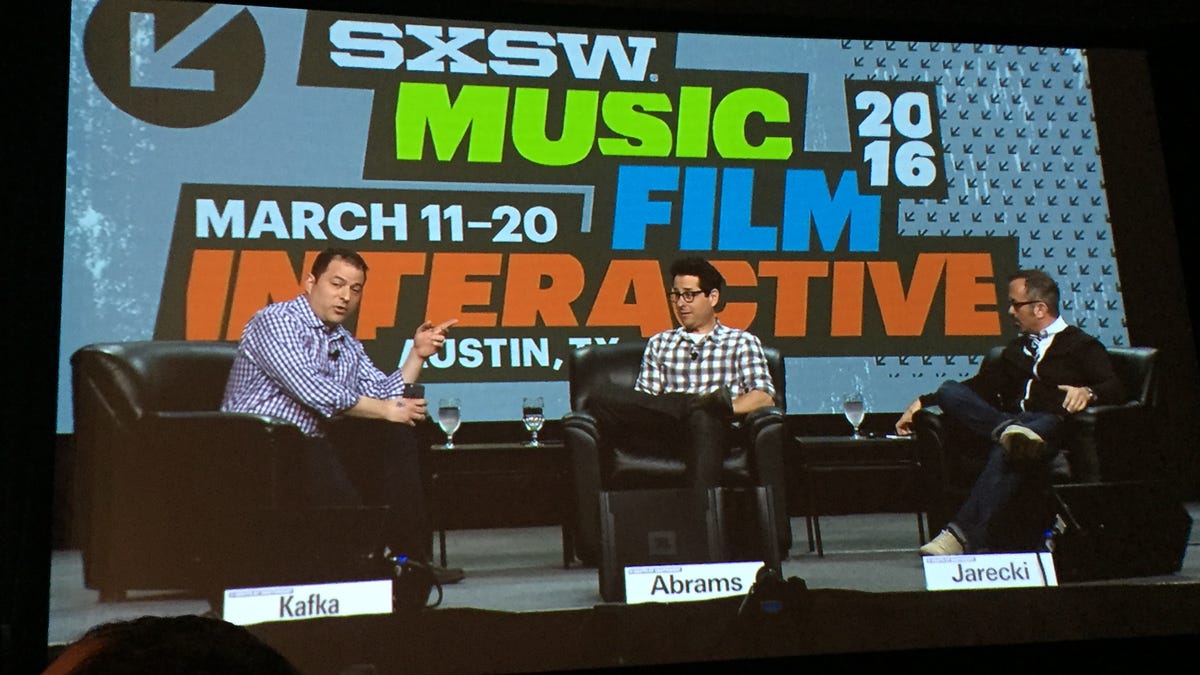J.J. Abrams on the blessings and curses of technology
The Star Wars director, along with longtime friend and "The Jinx" director Andrew Jarecki, talks about artificial intelligence, special effects and why tech can be a "nightmare" for filmmakers.
J.J. Abrams is the steward of a certain movie franchise with the famous opening, "A long time ago in a galaxy far, far away." And apparently the director of the latest Star Wars saga really takes the spirit of that line to heart: otherworldly technology balanced with a touch of old school.
That was the theme Monday during a keynote with Abrams and longtime friend Andrew Jarecki, director of HBO's "The Jinx," at the South by Southwest tech, film and music festival here in Austin, Texas. The two talked about the promise of technology, along with its excesses.
One frustration for Abrams: Everyone's got a phone now, and increasingly, people are watching movies on those tiny screens. For a director who's created the vast deserts of Jakku and the expansiveness of a star field, it can be unsettling to think someone might watch such a big movie on a such a little rectangle.
"It's the nightmare of every storyteller that people are going to watch it on something so small," Abrams said. (And that's likely to happen, because "Star Wars: The Force Awakens" will be released on iTunes and Google Play just a few weeks from now.)
He did concede, though, that he's watched films on smartphones too, and he doesn't remember the movie scenes feeling small. So it may just be a case of an artist's protectiveness.
If any pair of directors is qualified to talk tech and movies, it's these guys. For one, they've both started apps. In 2011, Abrams' production company, Bad Robot, released an iPhone special effects app. In January of this year, Jarecki started, and Abrams backed, a social video app called KnowMe, a cross between Snapchat and Instagram that Jarecki demoed onstage here. Both are well aware of how tech has changed the lives of everyday people, as well as the content they watch.
Since its release in late 2015, "The Force Awakens" has been lauded for its use of practical effects, especially since the Star Wars prequels that preceded it were panned for being so overrun with computer graphics. Abrams said that for his Star Wars movie, CGI effects were used more often than not to remove a puppeteer or a rig from a shot, rather than adding something else.
Abrams also gave the audience a glimpse of the Bad Robot-produced HBO show "Westworld," based on a Michael Crichton book about a futuristic theme park where robots look like humans and behave badly.
Speaking to a handful of reporters after the keynote, Abrams elaborated on artificial intelligence, the burgeoning science of computers that think and act more like people. "At the very least, it makes for great TV," he quipped. "At the very worst, it's the demise of all of us."
And while he's been thinking of these concepts for a long time, his company's name, though fitting for his current project, isn't a meditation on the consequences of AI. It's actually an idea he had for a children's book. Still, he said, "that may be the weirdest, unintentional fortune-telling of my life."
It's not all doom and gloom for tech, though. During the panel session, the two directors talked about how much technology has opened up the world for people to be creative. Jarecki made a point about people being able to have a camera everywhere they go.
Abrams touted the benefits of technology becoming cheaper and more manageable. He said that around 10 minutes of "The Force Awakens" was shot in-house at Bad Robot, without the giant stages and lights of a large-scale production.
Which is appropriate for what Abrams wanted to do with the movie -- make that galaxy far, far away a little less far.


